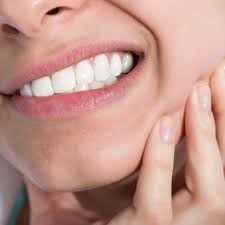Meet Martin Morley, Sedation Team Lead
Need to Know: White Spots on the Gums
 Common reasons for white patches appearing on the gums include mouth ulcers and oral thrush, caused by a Candida infection. However, some conditions with similar symptoms are more serious so it’s best to see your dentist if you notice white patches.
Common reasons for white patches appearing on the gums include mouth ulcers and oral thrush, caused by a Candida infection. However, some conditions with similar symptoms are more serious so it’s best to see your dentist if you notice white patches.
A few tips to prevent these white spots:
– Avoid brushing or rinsing with products that contain sodium lauryl sulfate.
– Avoid irritating mouth tissue by brushing gently with a soft-bristled brush.
– Avoid smoking or consuming any tobacco products.
– Limit sugar, salt and alcohol.
Early treatment of any dental issue is recommended. Regular checkups by a dentist will ensure your oral health is monitored effectively.
“The white spots may be accompanied by other symptoms such as pain or discomfort.”
Full article here:
https://www.medicalnewstoday.com/articles/321454.php
The Wisdom of Removing Wisdom Teeth
 Back in our ancestry, wisdom teeth were necessary for chewing tough foods like roots and meat, but are largely unnecessary in the modern world. Rather than being of benefit, wisdom teeth can cause problems –especially if they erupt improperly through the gums or become impacted.
Back in our ancestry, wisdom teeth were necessary for chewing tough foods like roots and meat, but are largely unnecessary in the modern world. Rather than being of benefit, wisdom teeth can cause problems –especially if they erupt improperly through the gums or become impacted.
For these reasons many people opt to have the dentist extract them rather than risk potential future dental problems.
Impacted wisdom teeth can:
– Be painful
– Become infected
– Cause other dental problems
An x-ray at the dentist will show where your wisdom teeth are and if they are impacted and whether they should be removed or not. Further reading on the topic can be found at https://yourdentalhealthresource.com/do-we-need-our-wisdom-teeth/.
Why Bad Taste In The Mouth Could Be Fatal
People often experience bad taste due to the flu and medication. However, studies reveal that oral bad taste could be a sign of more serious illnesses. Here’s more.
Main points:
– Different forms of bad taste are salty, metallic, bitter or sickly sweet.
– Smoking, alcohol, sugary/acidic foods all cause bad taste.
– Hormonal changes, Hepatitis B, chemo, acid reflux disease, and dry mouth also cause bad taste.
– Treat bad taste at home by avoiding alcohol and tobacco, brushing your teeth daily, and rinsing with mouthwash.
Please, consult your doctor and see the dentist for assessment.
Learn more here:
Why It’s Important To Brush Your Teeth With The Right Technique
When it comes to brushing, technique matters just as much as frequency.
Key takeaways:
– Brushing too hard can cause enamel erosion, which is evident in teeth discolouration or sensitivity.
– People who have gum disease and brush too hard can experience gum irritation and bleeding.
– Brushing aggressively will not make you less prone to cavities. In fact, the opposite is true.
If you are not sure about your brushing technique, ask your dentist for advice next time you go for a checkup.
Read the full story here: https://yourdentalhealthresource.com/am-i-brushing-my-teeth-too-hard-what-are-the-signs/
What is a Gingival Graft?
A gingival graft is a periodontal treatment for excessive gum recession. A periodontal dentist will perform the treatment on the area where the gums have receded so as the teeth roots are showing. The graft involves taking healthy mouth tissue and placing it in the exposed gum area.
The three key reasons for the treatment are:
– To encourage the growth of healthy new gum tissue
– To prevent further gum recession avoiding further exposure of the roots
– To reduce sensitivity which is a symptom of receding gums
“Before getting a gum graft, your dentist will evaluate your smile and attempt to treat your gum disease without surgery. If your gum disease is caught early, a root planing and scaling (in other words, a deep cleaning) may be all that’s needed to remove the infection and restore your smile back to normal.”
Learn more about the procedure here https://yourdentalhealthresource.com/what-is-a-gingival-graft/
The Fallacy that Brushing Alone will Prevent Dental Erosion
A traditional dentist would sometimes claim that brushing alone would help to prevent the erosion of enamel on the surfaces of teeth. Conversely, a recent project concluded that this is not the case. Some of the most important results included:
– Out of nine different toothpastes, each one eroded human teeth to a point.
– Larger abrasive particles can cause more damage.
– Preventing tooth decay involves other actions such as dietary modifications and regular dental appointments.
“The researchers plan to begin a more specific in-vivo study that will also include pain evaluations.”
This hyperlink offers more details:
https://www.sciencedaily.com/releases/2018/03/180313152118.htm
Losing Teeth Is Harmful To Your Heart
Middle-aged adults with poor oral health are at a higher risk of cardiovascular disease (CVD). This is a class of heart and blood vessel diseases like stroke, clots coronary heart disease and atherosclerosis, or hardening of the arteries.
Summary:
– Avoid dental-related CVDs by brushing your teeth two times daily and visiting the dentist for regular assessments and cleanings.
– You can reduce the risk of CVD by quitting tobacco, eating a balanced diet, and exercising.
– Also consult the dentist about getting dental implants to replace your missing teeth.
Protect your teeth by wearing a mouthguard to sports and treating teeth grinding.
Read more here:
https://www.medicalnewstoday.com/articles/321302.php
Do You Qualify for an Implant-Supported Bridge?
A dentist may suggest an implant-supported bridge if you have a number of teeth missing. However, there are several factors which will determine whether or not this is a realistic possibility.
Three concerns include:
– More than one adjacent tooth must be missing.
– Your jaw needs to be able to support the implant and its foundations.
– A bone graft may be necessary in order to provide a strong foundation.
“You’ll need to have at least one natural tooth missing or more in a row.”
Additional information can be found here:
https://yourdentalhealthresource.com/who-is-a-candidate-for-an-implant-supported-bridge/
What Smoking Does To Your Smile
If you smoke, you are damaging your smile. Smoking increases the risk of many oral health problems and reduces your body’s ability to heal itself after treatment.
Main points:
– Smokers are twice as likely to have gum disease.
– Oral cancer is a serious risk for smokers.
– Poor gum health and infections can lead to loss of teeth.
If you continue to smoke, it’s essential to have regular check-ups with a dentist.
“The longer you smoke and the more you smoke, the more your smile will be impacted by oral health problems such as gum disease.”
Article:
https://yourdentalhealthresource.com/are-cigarette-smokers-more-prone-to-dental-health-issues/
